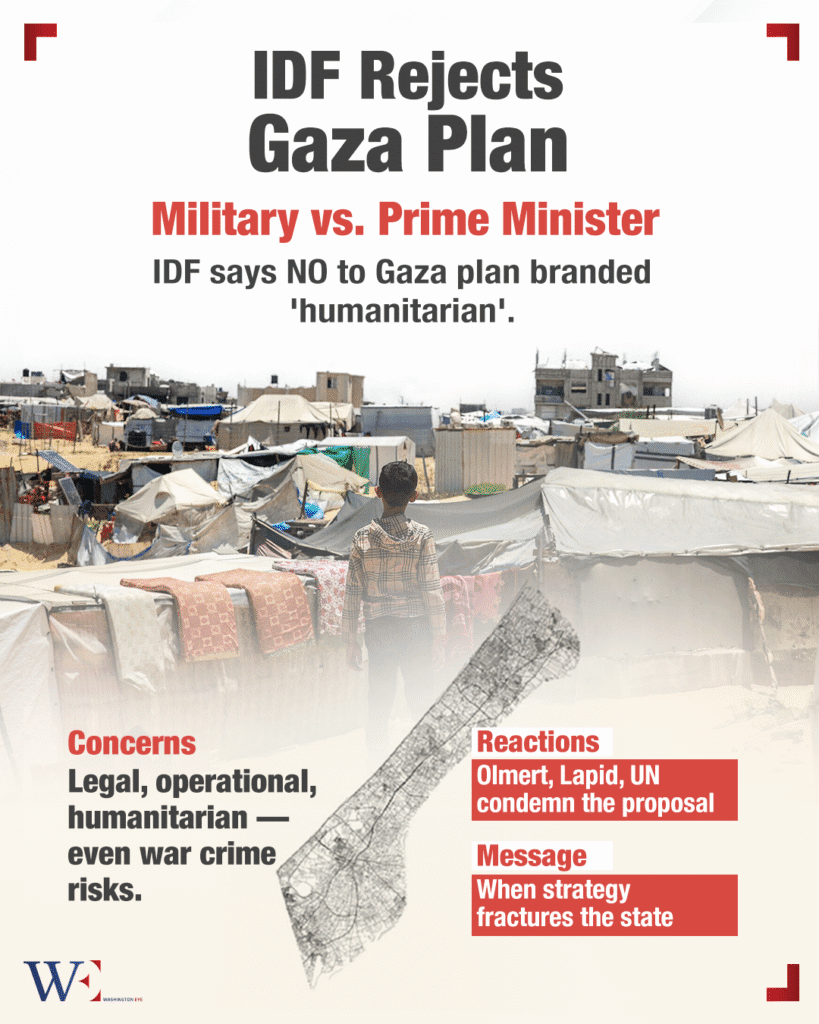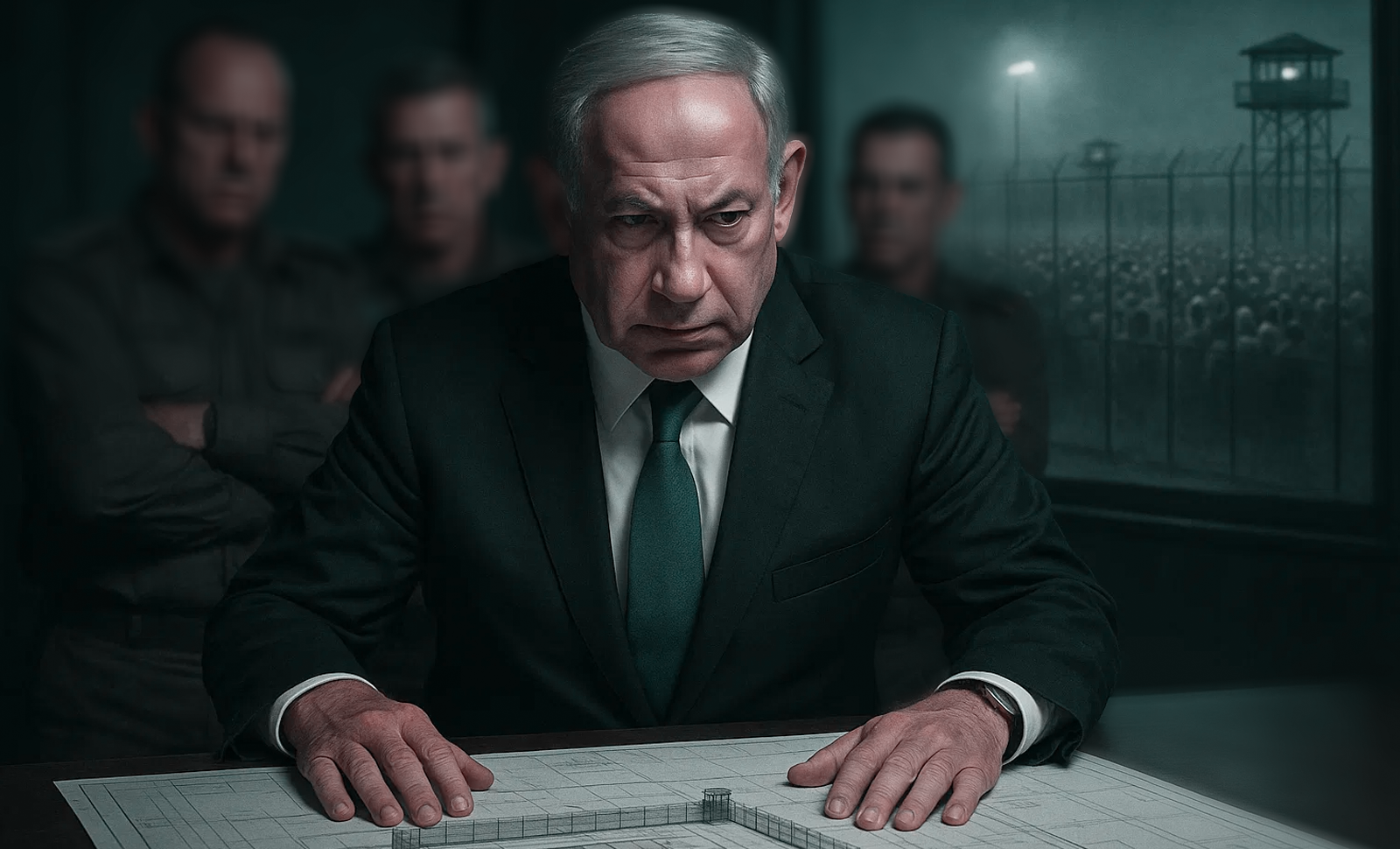Israeli Prime Minister Benjamin Netanyahu’s proposal to create what he brands a “humanitarian city” near Rafah for displaced Palestinians has triggered rare and vocal opposition from the Israel Defense Forces (IDF). Far from being a neutral shelter, the plan involves constructing a militarized enclave designed to relocate up to 600,000 Palestinians in southern Gaza under heavy surveillance, restricted exit, and indefinite containment. Internally, the IDF’s General Staff views the project as both strategically counterproductive and diplomatically explosive. Military leadership, including Chief of Staff Lt. Gen. Herzi Halevi and his deputy Eyal Zamir, have warned that such a relocation zone would resemble a de facto prison camp—not a temporary refuge—and carry unbearable humanitarian and legal costs.
This rebuke from within the military is significant. The IDF typically maintains institutional discipline and avoids public opposition to government policy. However, it appears that the leadership has calculated that implementing Netanyahu’s plan would not only place Israeli soldiers at legal risk for potential war crimes but also undercut fragile ceasefire talks and further destabilize an already collapsing humanitarian situation in Gaza. The IDF estimates the project could cost over $4 billion, require many months to complete, and undermine operational effectiveness at a critical time.
Dissent at Home, Condemnation Abroad
The backlash has not been limited to the IDF. Prominent Israeli politicians, including former Prime Ministers Ehud Olmert and Yair Lapid, have condemned the project in unprecedented terms. Olmert stated plainly that the plan “looks like a concentration camp”, while Lapid accused Netanyahu of committing to a policy of ethnic cleansing under the guise of humanitarian protection. This language is not merely symbolic; it reflects a growing awareness, even among members of the Israeli elite, that Netanyahu’s vision for Gaza marks a dangerous departure from past military doctrine built on demographic expulsion as statecraft.
The broader international community has responded with alarm. UNRWA’s director, Philippe Lazzarini, warned that the proposal “risks being remembered as a second Nakba”. Human rights organizations have compared the plan to the internment strategies of authoritarian regimes, noting that this would effectively transform southern Gaza into an open-air detention complex. These accusations are not hyperbole; they are grounded in legal definitions from the Geneva Conventions and supported by mounting evidence that Israel is pursuing policies designed to forcibly transfer Palestinians from their land under the cover of security operations.
Implications for Israel’s Strategic and Legal Future
The IDF’s resistance underscores the degree to which Israel’s military institutions are being drawn into a dangerous confrontation with its far-right political leadership. While the army’s objections may be rooted in operational pragmatism and reputational concerns, they reveal growing discomfort with being the enforcers of a strategy that international law evidently identifies as a form of apartheid and population transfer. The involvement of Israeli reservists petitioning the High Court against the plan further highlights a creeping fracture within Israeli society over what constitutes acceptable wartime conduct.
Moreover, the implications of proceeding with the plan extend beyond Gaza. At a time when the International Court of Justice is actively reviewing genocide charges against Israel, the construction of a mass internment facility could be introduced as concrete evidence of intent to destroy a population in whole or in part. The very architecture of the proposed “humanitarian city”—designed for surveillance, restriction, and containment—mirrors historical precedents of ethnic separation and forced displacement that have previously been classified as crimes against humanity. If implemented, this policy may not only damage Israel’s diplomatic relations but also bind its officials more tightly to criminal accountability under international law.
The plan also risks obliterating any remaining legitimacy Israel claims in global forums. While its government has long justified military campaigns in Gaza as necessary counter-terrorism measures, the optics of confining an entire civilian population—nearly half of whom are children—into a militarized compound with no legal status or political horizon, presents a fundamentally indefensible position. The IDF’s opposition, while notable, is unlikely to reverse this reputational freefall unless it is accompanied by sustained legal, civil, and diplomatic resistance from within and beyond Israel.
A Turning Point in Gaza—and for Israel Itself
The IDF’s resistance may delay implementation, but it cannot reverse the structural shift already underway: a strategy of political ethnonationalism, and the hollowing out of any forms of legal restraint in favor of demographic control.
This episode is not just about one camp or one policy. It is a reflection of the broader collapse of any credible commitment to Palestinian rights inside Israeli governance. The proposed internment plan—and the military’s attempt to resist it—may come to symbolize the moment Israel definitively abandoned even the pretense of coexistence for a policy of enforced segregation, expulsion, and mass confinement. If this moment passes without international intervention, it will set a precedent not only for Gaza but for how the world responds to modern methods of ethnic cleansing under the guise of humanitarianism.

















